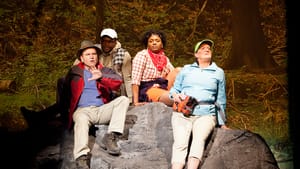Stay in the Loop
BSR publishes on a weekly schedule, with an email newsletter every Wednesday and Thursday morning. There’s no paywall, and subscribing is always free.
Going back to nature to find one's true self
Lisa D'Amour's 'Cherokee' at the Wilma

Do we all dream that if we could just get out of the rat race, away from the city and our jobs, that life would be better? Or is that just what we think we should want? All I know is it doesn’t work for me. I love living in the city. I love concrete and tall buildings and people everywhere I go. I love having five coffee shops within two blocks of me and stores around the corner when I need some retail therapy.
I find nature often terrifying — it’s so random, so unpredictable. So when I go to see a play about two couples on a camping trip, I know that there is only trouble ahead. In Cherokee by Lisa D’Amour, two seemingly happy, but inevitably dysfunctional, couples do just that. They’ve bought tents and camping gear and packed it all into their car to spend a few days in Cherokee, North Carolina to go back to nature and get away from it all.
John (David Ingram) has had a run of bad luck — laid off from his job and getting over prostate cancer, he’s a mess. His wife Janine (Marcia Saunders) is his anchor. Traci (Ashley Everage), who’s just realized she’s pregnant, and her husband Mike (Kevin Jackson) seem like the perfect young couple starting out and planning their future.
Janine, a third-grade teacher, has high hopes for the group. She wants everyone to change, and most of all she wants to find the person inside herself that she knows is there. There’s something about going back to nature that makes people get all philosophical about getting back to basics and the meaning of life and how we should treat nature better and be better ourselves.
Because it’s set near the Trail of Tears, the route taken by Cherokees during their relocation by the U.S. government in 1838 during which 4,000 died, they also wrestle with whites’ treatment of natives who were here before us. Josh (Kalani Queypo), a local Cherokee, appears in their camp and becomes the voice of the Cherokee Indians, although he’s not above appearing in the outdoor drama at the local casino to pay his bills.
Cherokee doesn’t provide easy answers. Loyalties to one another, to oneself, to one’s tribe are challenged. Do you go where you’re happy? Do you do what’s expected of you? Technology is the enemy and cell phones and computers create havoc — and trust is based on what you can Google about someone, not how you feel about him or her.
The script bobs and weaves. Events are often contrived instead of organic, and the actors sometimes seem uncomfortable with their lines because they’re making statements at each other rather than really talking to each other. Or maybe that’s the point: We’re not very good at communicating what’s important in our lives. We’re caught up in the moment, or we plan too much. We let our emotions run away with us. We stay with or abandon those we say we love. We compromise our values to pay the rent, and then don’t know who we are.
The staging is effective. The crunchy sound of the earth underfoot, the towering trees, the tents where they sleep at night, and the rock in the middle that represents a mountain to be climbed. Night and day pass and pass again, as the characters wrestle with lifestyle choices and commitments. There’s something at the heart of Cherokee that makes it worthwhile, it just needs to figure out what that is and focus it more clearly. Perhaps a little less philosophizing would help.
Meanwhile, I’m off to one of my coffee shops for a latte and a scone.
What, When, Where
Cherokee, by Lisa D’Amour, Anne Kauffman directed. Through February 8, 2014 at the Wilma Theater, 265 S. Broad St., Philadelphia. (215) 546-7824 or www.wilmatheater.org.
Sign up for our newsletter
All of the week's new articles, all in one place. Sign up for the free weekly BSR newsletters, and don't miss a conversation.

 Naomi Orwin
Naomi Orwin